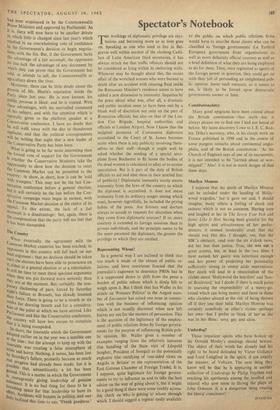Spectator's Notebook
THE workings of diplomatic privilege are mys- terious and becoming more so as time goes on. Speaking as one who used to live in Bel- gravia well within earshot of the clashing Cadil- lacs of Latin American third secretaries, it has always struck me that traffic offences should not be considered as lying within its sheltering walls. Whatever may be thought about this, the recent affair of the wretched women who were burned to death after an accident with cleaning fluid inside the Rumanian Minister's residence seems to have added a new dimension to immunity. Inquiries by the press about what was, after all, a dramatic and public incident seem to have been met by a blank wall of discretion not only on the part of Rumanian officials, but also on that of the Lon- don Fire Brigade, hospital authorities and officials at London Airport. Now I know that the incipient paranoia of Communist diplomats accredited to the Court of St. James becomes acute when there is any publicity involving them- selves or their staff—though it might well be asked whether the sending of a special aero- plane from Bucharest to fly home the bodies of the dead women is calculated to allay or to arouse speculation. But is it part of the duty of British officials to aid and abet them in their morbid fear of publicity? Diplomatic immunity surely means immunity from the laws of the country to which the diplomat is accredited. It does not mean immunity from its ordinary usages among which must, however regretfully, be included the prying habits of the press. Are firemen and doctors always to accede to requests for discretion when they come from diplomatic sources? If so, more courtesy is extended to foreign missions than to private individuals, and the principle seems to be the more paranoid the diplomats, the greater the privilege to which they are entitled.






























 Previous page
Previous page